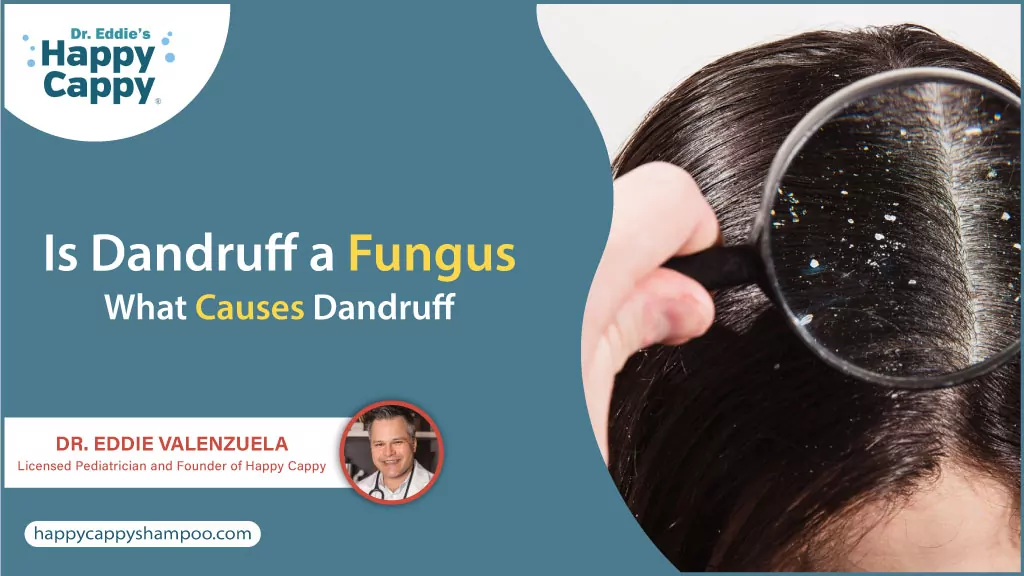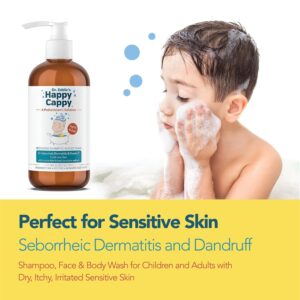
Dandruff is one of the most common skin conditions seen in both adults and children that causes itching and flaking of the skin on the scalp. It affects around 50% of the population. It is very likely you may have experienced this irritating condition at some point in the past.
Some people consider dandruff a fungus. But is dandruff a fungus? Discover the truth in this blog.
Is Dandruff a Fungus?
No, Dandruff is not a fungus. However, it can form due to a fungus on the scalp.
One of the most common causes of dandruff is a yeast-like fungus called Malassezia globosa.
Malassezia Yeast
Malassezia is found on almost every scalp, feeding on the naturally produced scalp oil called sebum. As Malassezia feeds on the sebum, it generates omega-9 fatty acids. These fatty acids, often called oleic acids, are carboxylic acid varieties and can irritate about half the population.
This irritation causes the scalp to increase the rate at which it renews its skin cells. New skin cells form before the old ones fall. These excess skin cells clump together and flake off as dandruff.
It is important to understand that Malassezia yeast is not the sole cause of dandruff; other factors may also cause this irritating skin condition.
What Causes Dandruff?
Dandruff is a common scalp condition that causes flaking and itching of the skin. Till now, the most significant cause of dandruff has yet to be discovered. Several elements can contribute to its development:
1. Dry skin
It is the most common cause of dandruff. When the scalp becomes dry and flaky and the dead skin cells start to fall off from the scalp people call the flakes and the condition “dandruff.”
2. Seborrheic dermatitis
This is another common skin condition that causes pink, itchy, and greasy skin. In some cases, it can cause dandruff on the scalp. Seborrheic dermatitis in children and babies is known as cradle cap.
3. Not shampooing enough or excessive shampooing
When the scalp isn’t cleaned regularly, oil and useless skin cells accumulate, which may form dandruff. Conversely, excessive shampooing can strip the scalp of its natural oils and cause dryness and flaking.
4. Sensitivity to hair products
A few individuals can be sensitive to certain hair care products like shampoos, conditioners, or styling products, leading to dandruff.
5. Contact dermatitis
Allergic reactions to some specific substances like hair dyes, soaps, or even certain clothing fabrics can cause dandruff-like symptoms.
6. Stress
Encountering high stress can trigger or worsen dandruff. Even though the exact connection between stress and dandruff is not fully understood, this does happen.
8. Other clinical conditions
Dandruff can also be a symptom of specific clinical situations like psoriasis, eczema, or a weakened immune system. It’s essential to remember that while dandruff is a common problem, it’s also harmless and can be easily managed with appropriate scalp care and the use of easily attainable over-the-counter anti-dandruff products.
Dandruff VS Scalp Fungus
Though dandruff is not a fungus, there are invasive fungal species (known as Trichophyton and Microsporum) that can infect the scalp and shafts of hair and cause localized dandruff-like symptoms with hair loss and sometimes severe inflammation. The medical term for this kind of scalp fungus infection is tinea capitis. However, there are ways to differentiate between scalp fungus and dandruff. For example:
- Scalp fungus can cause the hair to fall out in patches, as it weakens hair fibers and causes itching, which makes those suffering from the infection scratch and cause further hair loss.
- Fungal infections on the scalp, if untreated, can lead to large swellings or bumps that can be painful and, if left untreated, can cause permanent scarring and hair loss.
- Severe fungal infections on the scalp can cause swollen glands
- For clarification, when scalp fungus is in play, doctors tend to use the word “tinea capitis” to describe the situation. If the fungus is found elsewhere on the body it is known as “tinea corporis.”
- Many people use the word ringworm, to describe an invasive fungal infection when it is found on the body.
- Dandruff does not cause localized hair loss, swelling, bumps, or scarring.
If you see any symptoms beyond itching and flaking, it is vital that you see a doctor and be evaluated for a scalp fungal infection.
How To Get Rid of Dandruff?
In most cases, dandruff is simply irritating and embarrassing. However, in the case of young children, it can manifest as the more inflamed version–seborrheic dermatitis.
The most effective way to treat dandruff is with a dandruff shampoo, a product formulated especially for dandruff and which contains the ingredient pyrithione zinc. Pyrithione Zinc has anti-fungal properties that help reduce the quantity of Malassezia fungus on the scalp. Pyrithione zinc also tackles seborrheic dermatitis.
- Wash your scalp 2 to 3 times a week with a medicated dandruff shampoo.
- Leave shampoo on the scalp for 2 minutes before rinsing it off.
- Rinse properly and pat dry your hair instead of rubbing them.
- Try brushing your damp hair at least once a week to get rid of excess flakes.
- Use a gentle fine-toothed comb or a cradle cap brush to remove the scales.
Best Dandruff Shampoo
The best dandruff shampoo is the one that is free from harsh chemicals like fragrance, sulfates, parabens, and dyes. These chemicals can further irritate the scalp and worsen dandruff.
Choose a shampoo that contains natural ingredients and is specially formulated to reduce flaking, scaling, and itching associated with dandruff. An excellent option is Happy Cappy Medicated Shampoo & Body Wash, made with 95% natural ingredients:
- Licorice root extract to soothe redness.
- Provitamin B5 and apple fruit extract to moisturize hair and skin.
- Pyrithione zinc for effective and fast relief of flakes, scale, and irritation associated with dandruff and seborrheic dermatitis (commonly known as cradle cap).
Its unique formula targets dandruff at the source while protecting sensitive skin. Find this effective yet gentle shampoo and body wash for dandruff on Amazon or at a Walmart or Walgreens store near you.
Conclusion
Is dandruff a fungus? It is a common question often asked by people experiencing dandruff. The truth is dandruff is not fungus.
However, it is caused by a fungus that is naturally present on everyone’s scalp Malassezia yeats. The overproduction of this fungus can lead to inflammation and cause dandruff.
Malassezia yeast is not the only cause of dandruff there are other factors too such as dry skin, contact dermatitis, not shampooing enough, and stress.
The best way to get rid of dandruff is by using a Happy Cappy Anti- Dandruff Shampoo at least 2 to 3 times a week. If your dandruff is not getting better with the use of an anti-dandruff shampoo then consult a doctor there are chances you may be experiencing similar skin conditions like eczema, psoriasis, or ringworm.
FAQs
What could be the major cause of dandruff?
There might be several causes of dandruff, including dry skin, oily skin, and irritated skin.
How to get rid of dandruff?
You need regular cleansing if you are suffering from mild dandruff. It is recommended to use a gentle shampoo to help reduce oil and skin cell buildup.
Are dandruff and fungus the same?
No, dandruff and fungus are not the same. Dandruff is caused by a fungus known as Malassezia, but itself is not a fungus. Both of them are different and should be treated differently. It is best to consult a doctor if you are unsure whether you have dandruff or fungus.
Will dandruff cause hair loss?
Dandruff does not directly cause hair loss. However, the hair follicles may become weak due to excessive scratching and dryness, resulting in the hair falling. But don’t worry, this hair will grow back naturally.
Will using oil make my dandruff worse?
You may have believed that oil helps treat dandruff, but that is untrue. Oil can cause more harm than benefit. When your scalp gets oily, it attracts more dirt, which can mix with dandruff and cause more itching.
How to identify if I have scalp fungus?
Scalp fungus usually appears in scaly, circular patches on the scalp. It can also cause hair loss in the form of patches. It can also cause blisters on the scalp; if not treated properly, it can lead to painful swelling and permanent scars.
Will my hair grow back after the scalp fungus gets better?
Yes, the hair will naturally grow back once the scalp fungus is treated and resolved.

